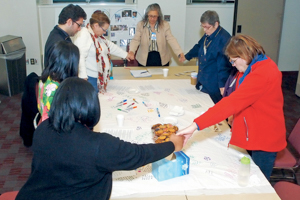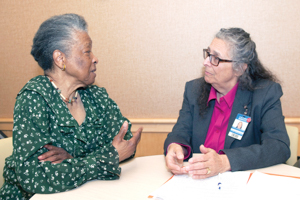By PATRICIA CORRIGAN
After her husband died, Betsy Sadewhite attended grief support meetings at Calvary Hospital in the Bronx for about a year. Then she signed up for a new group at the hospital, one that focuses on how to find meaning in your life after a loss.
"Being part of the group changed my approach to life, made me more aware of myself as an individual, as opposed to being part of a couple," said Sadewhite, 68. A retired librarian, she lives in Irvington, N.Y.

Sherry R. Schachter, center, leads a prayer during a grief support group run by Calvary Hospital in the Bronx, N. Y. The system tailors its offerings to cluster people with similar life experiences and relationships to the deceased, such as groups for adults mourning the death of a sibling.
The group, "The First Day of the Rest of Your Life: A Meaning-Centered Psychotherapy Group for Bereaved Individuals," is one of two new bereavement support groups at Calvary. The second one is for young adults ages 19 to 25.
"Bereavement support helps to normalize grief," said Sherry R. Schachter, the director of bereavement support services at Calvary. "We developed these new groups after evaluating the needs of people participating in our existing groups." Schachter is past president of the Association for Death Education and Counseling and has lectured at professional meetings around the world about bereavement support.
Perspectives on sorrow
Calvary offers free bereavement support groups for people of all faith traditions and ethnic and cultural backgrounds. Groups are held in the Bronx, in Brooklyn and in Manhattan. The hospital is considered unique in the New York area for the variety of bereavement support groups, each designed to address the needs of a specific population.
"This is part of our mission as a Catholic, faith-based institution," Schachter said. "Fortunately, our bereavement programs have been generously funded by a number of leading foundations, by several board members and by individuals."
Professionals lead all the groups and all program content is research-based. Specialized support programs for adults are offered for individuals who have experienced the death of:
- a child
- a young spouse/partner
- a spouse/partner
- an adult sibling
- a parent
Calvary also offers a "bereavement discussion group" for men. "Men grieve differently," Schachter said, "and they tend not to go to grief support groups." Groups also are available for young children and adolescents. Also, once a year, Calvary holds a one-week bereavement camp to help children and teens who have attended a bereavement support group at Calvary develop additional coping skills.
Serving different populations with different support services is essential, Schachter said, because grief differs "according to whom you lost, your relationship with that person and the circumstances."
Analytic approach
Bereavement support is not new for Calvary, the 'nation's only fully accredited acute care specialty hospital devoted exclusively to providing palliative care to adults with advanced cancer and other life-limiting illnesses. Since its founding in 1899, the hospital's core values have focused on compassion, respect for the dignity of every patient and non-abandonment of patients and families.

Schachter, right, provides grief counseling to a client.
"The First Day of the Rest of Your Life" — the new group for individuals who previously have attended a grief support group — helps meet the goal of sticking by bereaved individuals still in need of support. "They are in a different place in their grief a year or more after a loss, but some of them had been married 40 years and were alone for the first time in their lives," Schachter said.
The first group met in 2015; the second began late in September. The 12-week program, open to just eight people at a time, is based on Dr. Viktor Frankl's premise that people are motivated by an inner pull to find meaning in life. Frankl, a neurologist and psychiatrist, was a Holocaust survivor who died in 1997.
"In some of my groups, I often found myself talking about Dr. Frankl and how we can find meaning after a loss, and that led to starting the meaning-centered therapy group," Schachter said. "In this group, we go deeper, look for more personal insights. Participants must be open to exploring who they are and how they got to be that person."
Sadewhite was open to that. Her husband, Jim, was a patient at Calvary at the end of his life. He died in October 2013, the same year Sadewhite had retired, and just before the couple's 41st wedding anniversary.
"I owe a great deal to the meaning-centered group," she said. "I really worked it — read the materials and did the exercises — and being there made me stronger, more independent and more positive."
In 2015, the meaning-centered group met for 90-minute sessions and was geared toward individuals who had lost a spouse. This year, participants meet for two hours each week and the group is open to anyone who has completed a grief support program.
No pretense
The new group for young adults evolved because Schachter recognized "they didn't fit in" at support groups for teens or older adults. "If someone 19 or 20 loses a parent or a sibling, the issues are different from a loss experienced by someone who is 50," she said. "For instance, when a young adult loses a parent, support from their friends may be directed only toward the surviving parent."
The group, comprised of eight to 10 young adults who have experienced different kinds of losses, meets once a week for 90 minutes for six weeks. Then participants may rejoin — to date, six full sessions have been held — or "graduate out," Schachter said. "Most choose to come back. This is where they have an opportunity to open up and come to a feeling of peace."
Estefania "Stef" Moreno of Yonkers, N.Y., agrees with that. "Being part of the group has helped me feel not so lost and not so alone," she said. Moreno's father, Jose Moreno, a construction worker who helped clean up after the attacks on Sept. 11, 2001, died of lung cancer in November 2015.
"Since then, it's been such a roller coaster of emotions, and the group has helped me process and understand all those emotions — even the ones that were buried deep," said Moreno, 26, a speech pathologist. "At the meetings, I can just be the real me, take off the 'mask' and not have to pretend to be okay if I'm not."
Calvary intends to continue expanding and improving its bereavement support services, Schachter said. Soon the hospital will offer its "Precious Moments" — a group for bereaved children ages 6 to 11 — in Manhattan as well as in the Bronx. Plans also are in place to start a new group for adults whose siblings have died.
"After a loss, people need a ritual," Schachter said. "Some family members choose not to talk about it, but coming to a support group allows others the freedom to say they do want to talk about that loss."
Copyright © 2016 by the Catholic Health Association
of the United States
For reprint permission, contact Betty Crosby or call (314) 253-3477.